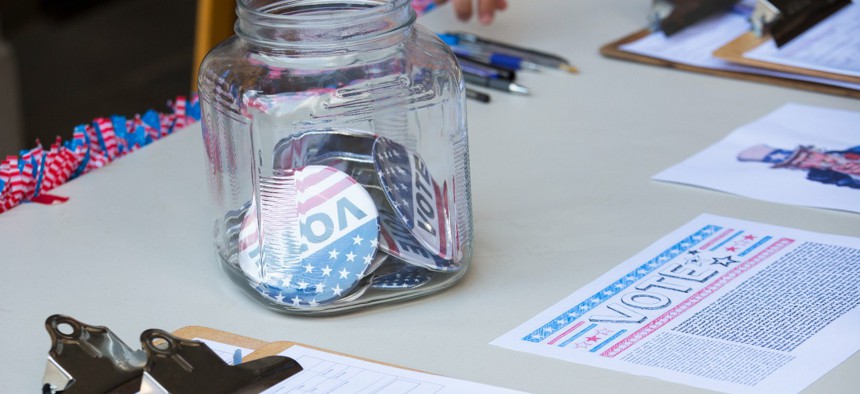
Ariel Skelley / Getty Images
Most Feds Won't Actually Be Able to Hold Partisan Office and Keep Their Day Jobs, Despite Precedent
Despite a new precedent, OSC does not plan to enter into settlement agreements in which civil servants can concurrently serve in partisan elected positions going forward.
While a newly established precedent allows federal employees to concurrently hold elected partisan office, the agency that enforces the related laws now says it does not plan to allow them to do so going forward.
The recently reconstituted Merit Systems Protection Board said in one of its first rulings after enduring five years without a quorum that a U.S. Postal Service employee, Rodney Cowan, did not have to give up his role as a country commissioner in Tennessee or quit his day job. An administrative judge had ruled that a settlement agreement Cowan struck with the Office of Special Counsel allowing him to keep both positions violated the Hatch Act, but the Board overturned that decision.
While the judge said the board has historically interpreted the law to block civil servants from concurrently holding political office, OSC successfully appealed after arguing a 2012 Hatch Act update made clear only that running for such a seat was prohibited. The employee agreed to a six-month suspension for violating the law, but was able to hold onto his elected seat and his postal position.
While the decision was precedent setting, OSC—the agency tasked with enforcing the Hatch Act—said the specific case with the USPS worker was “unusual” and it does not plan to enter into such settlement agreements in the future.
“Ethics officials and federal employees should be aware that Cowan presented an unusual situation,” the watchdog agency said. “OSC does not intend to enter into any settlement agreements that would allow an employee who violates the Hatch Act by running for a partisan political office to keep both their elected position and their federal employment.”
OSC further encouraged agencies to remind their employees they are not eligible to run for partisan office. Zac Kurz, an OSC spokesman, said agency leadership prior to current Special Counsel Henry Kerner had decided a suspension was sufficient punishment and “we are not in a position to second-guess that decision.” While Kurz maintained the Hatch Act “clearly does not” prevent feds from simultaneously holding elected office and MSPB affirmed OSC’s ability to enter into agreements that do not require those workers to separate from one of their jobs, the agency does not plan to use that ability in the future. OSC said it believes employees would only be able to maintain both positions if they specifically entered into a settlement allowing the arrangement, but it will no longer offer that option.
The decision had ruffled some feathers, with ethics experts questioning its wisdom and OSC conceding it had received “numerous questions about the case.”
Walter Shaub, former director of the Office of Government Ethics, said MSPB's decision was particularly problematic because Cowan, as a postal employee, could have been responsible for collecting ballots for his own race.
"They tried to play it cute," said Shaub, now a fellow at the Project on Government Oversight. "OSC shirked its responsibility."







